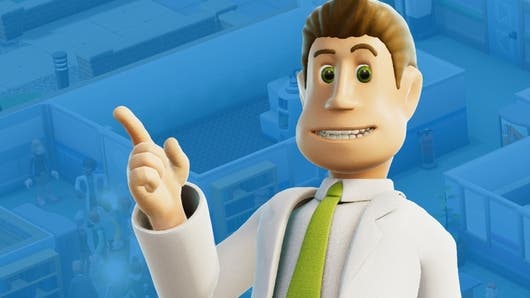Two Point Hospital proves that Theme Hospital's formula hasn't aged a day
A reward for your patients.
The tinny music begins, the isometric hospital outline pops up on screen. Your hospital doesn't have any rooms yet, let alone patients, but you need a reception desk. It's angular, purple. You place it by the sliding glass front doors of the hospital lobby, ready for the first people to file in. Now you'll need a receptionist, maybe a potted plant or two. Benches, of course - I like constructing two neat rows, back to back. And so it's on to hiring doctors, building a GP's Office and a Pharmacy, hiring a nurse to staff that. A handyman to water those plants. A vending machine. So begins every game of Theme Hospital - and so begins Two Point Hospital, as well.
If anyone was going to make a successor to Theme Hospital, then why not the team behind the original? Led by Bullfrog and later Lionhead veterans Mark Webley and Gary Carr, startup Two Point Studios has - to this Theme Hospital fan - done something remarkable: made a game which feels instantly familiar, 21 years on. Of course, it has the visual updates you'd expect - those rooms you're building within your hospital drop and plop into place, their walls gently rippling as you set them down (and yes, you can finally edit them on the fly, and make their floorplans other shapes than rectangular), your patients and staff are now little 3D people, and you can see how they're thinking and feeling via all sorts of colourful overlays. But the resemblance to Two Point Hospital's source material is astonishing - right down to those angular reception desks.
"I don't think we wanted to reskin [the original] and make an HD version," Webley says to me. "The character trait system, how you develop people, is designed to make you care about the staff and make them memorable," he adds, suggesting one particular new feature. It's an admirable idea, though there's no time in the hour-long demo I played to linger and really find out if it makes an impression. Just like in Theme Hospital, your first scenario in Two Point Hospital is a basic facility with the ability to cater to and cure only a handful of comedy ailments. Still, the pressure is immediately on to keep the whole enterprise profitable, ensure staff remain happy and, of course, try and keep patients alive. The initial level I played takes you through the basics of managing your hospital simulation and concentrates on just a couple of diseases only. Light Headedness, for example, is this game's version of Bloaty-Head Syndrome. You'll need to build a De-Lux machine to unscrew a Light Headed patient's lightbulb head and twist their real one back on. And again, just like in Theme Hospital, there's a Pharmacy and Ward to build and cure other ailments.
Visual polish aside, the differences between Two Point Hospital and its predecessor are few and far between in this early slice. Staff training isn't yet available, and there's no time to get to know hospital staff. Most of all, there's no way to try out Two Point Hospital's big new addition - the ability to revisit and keep managing your previous hospital projects once you have moved up and on. In the original game, you were stuck restarting everything from scratch every few hours as you were promoted and promptly given harder projects to pursue. In Two Point Hospital, all of your hospitals are still accessible, nestled on a world map which covers the fictional Two Point County. Each location has a three-star rating attached to it - and you'll need to revisit and keep working on multiple hospitals over time to win this.
"Maybe you get the first two stars in a hospital and start struggling, because there are people with illnesses coming in which you can't diagnose," lead designer Ben Huskins, another Lionhead veteran, tells me. "Later on you'll get new tech and be able to. And in fact at the start you can't train people, but when you get to the point you earn your training license you can do that, go back and promote them." The idea of setting the game over a particular area goes further than that, too. It's a location Two Point Studios wants to revisit again, in future games. "I really like the idea of establishing a world with interesting characters, recurring people," Huskins continues. "And even if we never made another game, it makes this more interesting to build into a place with existing people, places." Listen to the hospital radio and you'll hear mention of goings on around the county. Sometimes this will reflect events at your hospital - such as when you have to deal with a sudden major incident - and other times it will be when a local celebrity is in town. Later, they may appear at your hospital, too. It's a way of tying together events which - yes, you guessed it - could also happen in Theme Hospital, so that they now feel part of a more cohesive world.
When you have a game as beloved as Theme Hospital then perhaps there's little need to stray from the formula. But it's still a surprise, to me, to find how closely the formula has been applied. Two Point Studios even tried to hunt down Theme Hospital's original voice artist for the hospital PA ("The hospital administrator is cheating..."), such is their commitment to recreating the original experience. Is it a good thing? As a Theme Hospital fan, I think so - I felt immediately at home amongst the colourful overlays and menus, the game's deeper systems hiding just underneath. I'm intrigued to see how managing multiple hospital simulations on the fly brings to the experience. More, I'm intrigued what 2018 makes of this new Theme Hospital, that brilliant, barmy, game I remember from 1997.


